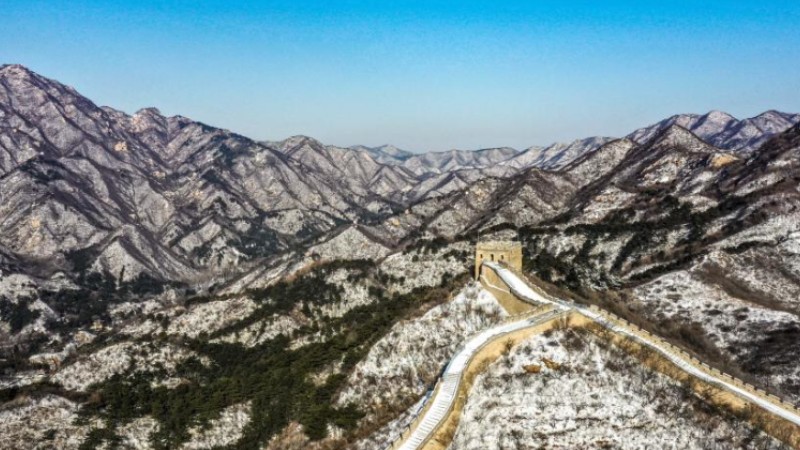Despite anti-subsidy probe, China-Europe EV cooperation is expanding
BEIJING, Dec. 23 (Xinhua) -- At SAIC-Volkswagen ID. Store X, located in Beijing SOLANA Lifestyle Shopping Park, sales managers are busy introducing various models of electric vehicles (EV), such as models ID.6X, ID.4X, and ID.3, to customers. Among them, the ID.3 is popular with its excellent performance price ratio.
SAIC-Volkswagen is not the sole EV brand preferred by Chinese consumers. In the nation's streets, one can observe the presence of domestic brands like BYD and XPENG, as well as numerous Western EVs, including Volkswagen, Audi, and Tesla, all of which hold appeal for Chinese consumers.
According to the European Automobile Manufacturers' Association, China is the third largest market for European Union (EU) EV exports after Britain and the United States.
European EV purchases are increasing in China. However, this fact illustrated by the figures and the cooperation between the China-EU EV industries was ignored. In October, the European Commission launched an anti-subsidy probe into Chinese EVs, claiming to protect EU producers against cheaper Chinese EV imports which are said to be benefiting from state subsidies.
Such claims are not substantiated. Multiple studies and market surveys indicate that the pricing strategy of new energy vehicle models exported from China to Europe is comparable to those of local European models and is often higher than prices in the domestic Chinese market.
Germany, the automotive leader in Europe, vehemently opposes the investigation. According to the German Association of the Automotive Industry, relying solely on anti-subsidy inquiries fails to tackle the urgent competitiveness challenges faced by Europe.
In the global market, commercial competition is inevitable, but proper and reasonable competition would contribute to technological progress so that consumers can enjoy better service.
Certain reports from Western media concerning the expansion of Chinese EVs in the European market may not offer a comprehensive view of the industry. They frequently overlook the broader reality that manufacturers are actively pursuing collaboration with China, offering global automakers access to component production and complete vehicles. Tesla, for instance, has established a factory in Shanghai.
In addition to those "Made in China," Western EV manufacturers also purchase various raw materials and components from China, the most important of which is the battery, reputed to be the heart of an EV. Nowadays, of the top 10 power battery sellers in the world, more than half of them come from China.
During an automotive conference in October in the city of Changchun in northeastern China, Professor Ferdinand Dudenhoffer from the German Automotive Research Center said that there was a very big demand for Chinese battery technology in Europe and that car companies such as Mercedes-Benz, BMW, and Volkswagen all needed batteries made in China.
Chinese EV manufacturers have established an increasingly close partnership with Europe. BYD, a Chinese EV manufacturer, set up an electric bus factory in the northern Hungarian city of Komarom in 2017, which is the first EV factory that BYD has invested in Europe, whose products are mainly electric buses and tourist coaches.
In the field of EV batteries, China-EU cooperation is being closely carried out. Stellantis, the world's fourth largest automotive group and Chinese battery manufacturer Contemporary Amperex Technology, a global leader of new energy innovative technologies, announced the signing of a non-binding Memorandum of Understanding for the local supply of lithium iron phosphate battery cells and modules to power Stellantis' electric vehicle production in Europe.
Chinese media reports indicate that numerous battery factories, including Gotion High-tech, China Innovation Aviation, and EVE Energy, have established a presence in Europe. Concurrently, European automakers are exploring the establishment of electrification facilities in China. BMW, for example, has invested in the sixth generation of power battery projects in Shenyang, Liaoning Province, and the main construction has been completed.
European EV customers, manufacturers, and officials are showing their admiration for Chinese EV enterprises. The anti-subsidy investigation is unlikely to yield tangible advantages, and there is a growing trend of cooperation between China and the EU in the EV sector.
Besides, the EU has experienced positive outcomes from engaging with China's EV industry chain, benefiting both in terms of EV sales and advancements in the EV field.
In 2023, the BYD ATTO 3 was awarded the prestigious title of "Electric Car of the Year" by News UK, whose Chinese producer has now partnered with UK electric bus manufacturers to promote green transport in this country. "China has a very powerful electric car industry. I'd much rather they made great cars in the UK that we could then capitalize from and export," said Dominic Johnson, minister of state in the UK Department for Business and Trade.
Photos
Related Stories
- China's Yiwu boosts int'l trade with increasing rail freight to Europe
- Yearender: China, Europe tighten exchanges to promote global stability
- How have China's EVs managed to win hearts and minds of Europeans?
- China's EV charging piles see robust growth in November
- Decoupling from China would be "complete folly" for Europe: former UN official
Copyright © 2023 People's Daily Online. All Rights Reserved.









